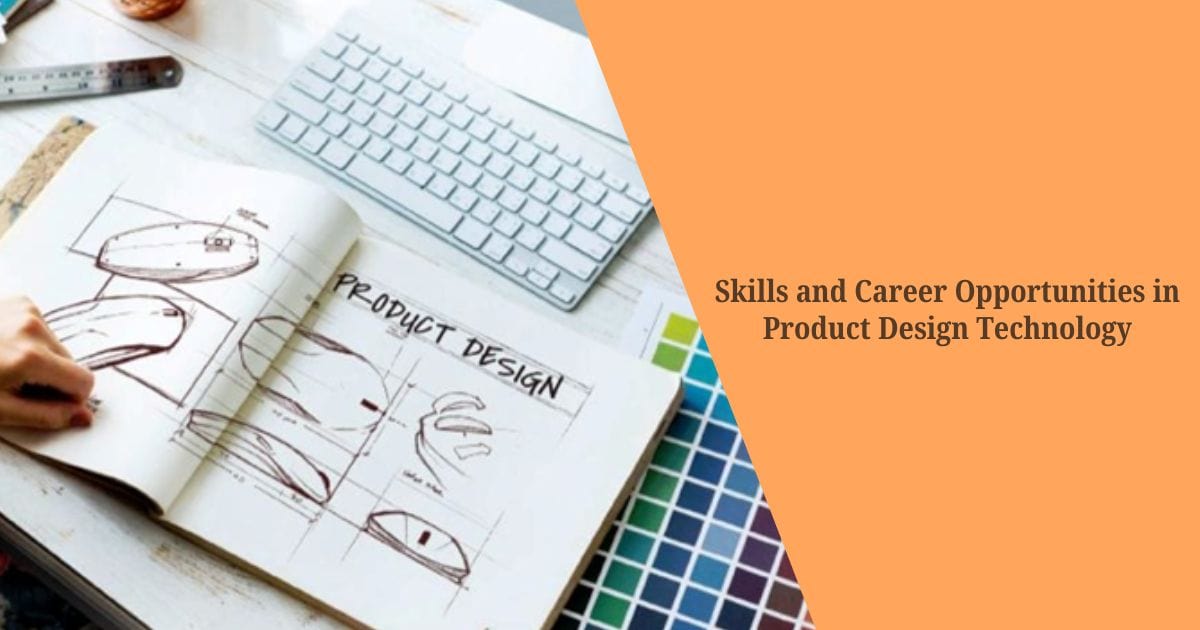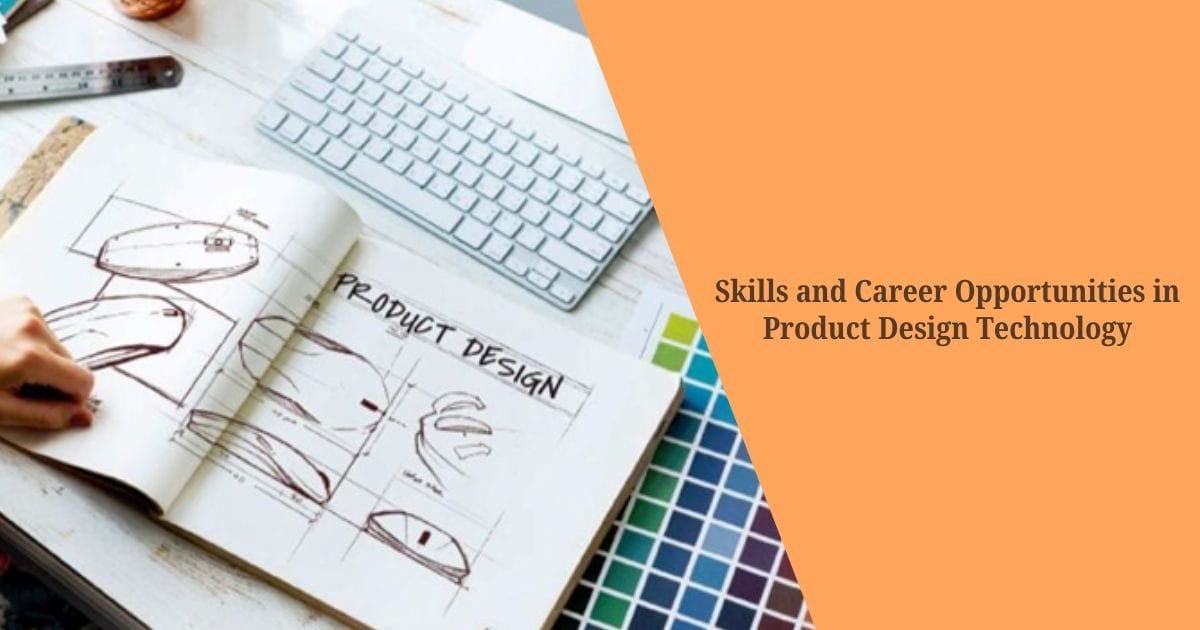In today’s rapidly evolving market, product design technology plays a crucial role in shaping the products we use daily. From the smartphones in our hands to the appliances in our kitchens, the ingenuity of product design influences functionality, aesthetics, and user experience. For those interested…
Skills and Career Opportunities in Product Design Technology
In today’s rapidly evolving market, product design technology plays a crucial role in shaping the products we use daily. From the smartphones in our hands to the appliances in our kitchens, the ingenuity of product design influences functionality, aesthetics, and user experience. For those interested in venturing into this exciting field, understanding the essential skills and potential career opportunities is crucial. It explores the world of product design technology, highlighting key skills, career paths, and the best Product Design Courses in Delhi, Product Designing Course in Delhi, and Product Designing Courses in Noida to kickstart your journey.
Understanding Product Design Technology
Product design technology involves the process of creating, innovating, and improving products to meet consumer needs and preferences. This multidisciplinary field integrates aspects of engineering, aesthetics, ergonomics, and usability to develop products that are not only functional but also appealing and user-friendly. For those interested in this dynamic field, enrolling in a Product Designing Course in Delhi can provide the essential skills and knowledge to excel in product design technology.
Making Product Design Effective
Students of Computer Science Engineering at top universities should follow these key points for creating impactful product designs:
User Understanding: Study the habits, dislikes, behaviors, and desires of end-users to design products that match their profiles and meet their needs.
Smooth Execution: Ensure seamless design and implementation, making it easy for customers to relate to, anticipate, and require your product.
Lifecycle Involvement: Engage in all stages of the product lifecycle—from pre-ideation research, conceptualization, and prototyping to usability testing.
Crucial Role in UX: As a product designer, you play a pivotal role in creating value-added products and enhancing the initial user experience.
Functionality Enhancement: Continuously add and improve functionality throughout the product’s lifecycle in a glitch-free and visible manner.
System and Process Design: Focus on behind-the-scenes aspects like system and process design to enhance the user interface, improving brand consistency and evolution.
Essential Skills for Product Design Technology
Creative Thinking: Creativity is the cornerstone of product design. Designers must envision new concepts and reimagine existing products to innovate and stay ahead of trends.
Technical Proficiency: A solid understanding of technical aspects such as materials science, manufacturing processes, and digital modeling is essential. Knowledge of CAD software like AutoCAD, SolidWorks, and Rhino is particularly valuable.
User-Centered Design: Understanding user needs and behaviors is crucial. This involves conducting user research, creating personas, and developing prototypes to test usability and functionality.
Problem-Solving: Product designers must be adept at identifying problems and developing practical, efficient solutions. This often involves iterative testing and refining designs based on feedback.
Communication Skills: Effective communication is key in collaborating with other professionals such as engineers, marketers, and stakeholders. The ability to present ideas clearly through sketches, presentations, and reports is vital.
Project Management: Managing timelines, resources, and budgets is a critical aspect of product design. Knowledge of project management tools and methodologies can help keep projects on track.
Attention to Detail: Precision in design is essential to ensure that products are functional and safe. Attention to detail helps in creating high-quality products that meet stringent standards.
Career Opportunities After Product Design and Tech Specialisation at TDV Design College
Pursuing a Product Design and Tech Specialisation at TDV Design College, recognized for its exceptional Product Designing Courses in Noida, opens up a wide array of career opportunities. With the blend of creativity, technical skills, and industry exposure provided by TDV, graduates are well-prepared to enter various fields within the design and technology sectors. Here are some prominent career paths that you can explore:
1. Product Designer
Role: As a product designer, you will conceptualize and create new products, from initial sketches to final prototypes. Your role will involve understanding user needs, brainstorming ideas, and working closely with engineers and marketing teams to bring your designs to life. Pursuing a b.des product design degree can equip you with the necessary skills and knowledge to excel in this role.
Key Skills: Creativity, user-centered design, CAD software proficiency, prototyping, and communication.
Industries: Consumer electronics, household goods, furniture, automotive, and fashion.
2. Industrial Designer
Role: Industrial designers focus on the aesthetics, functionality, and manufacturability of products. They work on a wide range of items, from everyday consumer goods to specialized industrial equipment.
Key Skills: Aesthetic sense, material knowledge, ergonomics, CAD, and manufacturing processes.
Industries: Home appliances, medical devices, toys, tools, and transportation.
3. UX/UI Designer
Role: UX/UI designers specialize in creating user-friendly interfaces for digital products. They focus on enhancing user experience by making interactions intuitive and enjoyable.
Key Skills: User research, wireframing, prototyping, usability testing, and software like Adobe XD, Sketch, and Figma.
Industries: Software development, mobile apps, gaming, e-commerce, and web design.
4. Design Engineer
Role: Design engineers bridge the gap between engineering and design. They ensure that product designs are technically feasible and can be manufactured efficiently.
Key Skills: Engineering principles, CAD software, material science, prototyping, and problem-solving.
Industries: Aerospace, automotive, electronics, and manufacturing.
5. Product Manager
Role: Product managers oversee the development process of products from conception to market. They coordinate between design, engineering, marketing, and sales teams to ensure the product meets market needs and business goals.
Key Skills: Project management, market analysis, strategic thinking, and communication.
Industries: Technology, consumer goods, healthcare, and finance.
6. Freelance Designer
Role: Freelance designers work independently, offering their design services to various clients. This path provides flexibility and the opportunity to work on diverse projects.
Key Skills: Self-discipline, client management, networking, and a strong portfolio.
Industries: Multiple industries depending on projects, including startups, marketing agencies, and consultancy firms.
7. Design Consultant
Role: Design consultants provide expert advice on design strategy, innovation, and problem-solving. They work with companies to improve their product offerings and design processes.
Key Skills: Analytical thinking, design strategy, trend analysis, and communication.
Industries: Consulting firms, design agencies, and corporate design departments.
8. Sustainable Designer
Role: Sustainable designers focus on creating products with minimal environmental impact. They consider the entire product lifecycle, from materials to disposal, to design eco-friendly products.
Key Skills: Knowledge of sustainable materials, life cycle assessment, environmental impact analysis, and green manufacturing processes.
Industries: Renewable energy, packaging, fashion, and consumer goods.
9. Academia and Research
Role: For those interested in the academic side of product design, opportunities exist in teaching and research. This path allows you to educate future designers and contribute to the field through research on emerging trends and technologies.
Key Skills: Research, academic writing, curriculum development, and public speaking.
Industries: Educational institutions, research labs, and think tanks.
Industry Insights and Future Trends
The product design industry is continuously evolving, driven by advancements in technology and changing consumer preferences. Here are some key trends shaping the future of product design:
Sustainable Design: There is a growing emphasis on sustainability in product design. Designers are increasingly considering the environmental impact of materials and manufacturing processes, leading to the development of eco-friendly products.
Smart Products: The integration of technology into everyday products is becoming more prevalent. Smart products that connect to the internet and offer enhanced functionality are in high demand.
3D Printing: 3D printing technology is revolutionizing product design by allowing for rapid prototyping and customization. This technology enables designers to create complex geometries and test their designs quickly and cost-effectively.
Virtual Reality (VR) and Augmented Reality (AR): VR and AR are transforming the way designers visualize and test products. These technologies provide immersive experiences that can simulate real-world usage and identify potential issues before production.
User Experience (UX) Focus: As competition intensifies, the focus on user experience continues to grow. Products that offer superior usability and user satisfaction stand out in the market.
Conclusion
A career in product design technology is both rewarding and challenging. With the right skills and education, you can create innovative products that improve lives and shape the future. Whether you pursue a Product Design Course in Delhi, Product Designing Course in Delhi, BDes Product Design, the opportunities are vast and varied. As the industry evolves, staying updated with the latest trends and technologies will ensure that you remain at the forefront of this dynamic field. Embark on your journey in product design technology today and make your mark on the world of design.






